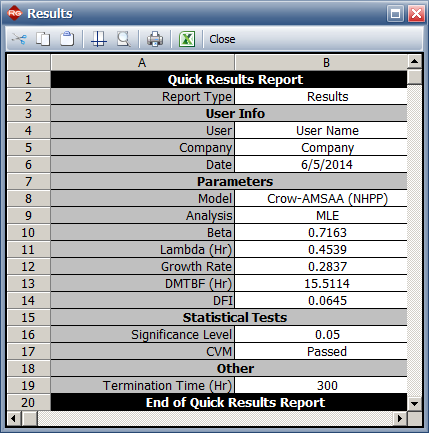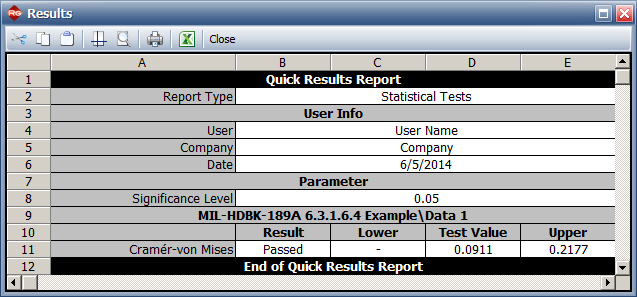Multiple Systems (Known Operating Times) Data Reference Example: Difference between revisions
Jump to navigation
Jump to search
No edit summary |
Kate Racaza (talk | contribs) No edit summary |
||
| (21 intermediate revisions by 2 users not shown) | |||
| Line 1: | Line 1: | ||
{{Reference Example| | {{Reference Example|{{Banner RGA Reference_Examples}}|Multiple Systems - Known Operating Times}} | ||
This example validates the results for multiple systems (known operating times) data in RGA. | |||
This example | |||
| Line 7: | Line 6: | ||
MIL-HDBK-189A, Section 6.3.1.6.4, pg. 156, 2009. | MIL-HDBK-189A, Section 6.3.1.6.4, pg. 156, 2009. | ||
For this example, the following will be calculated: | |||
*Parameters of the Crow-AMSAA (NHPP) model | |||
*Demonstrated MTBF (DMTBF) | |||
*Cramér-von Mises (CVM) goodness-of-fit | |||
{{Reference_Example_Heading2}} | {{Reference_Example_Heading2}} | ||
The following table shows the data. | |||
{| {{table}} | {| {{table}} | ||
| Line 69: | Line 75: | ||
|- | |- | ||
| 132.4||*153.7||286.1 | | 132.4||*153.7||286.1 | ||
|+'''Termination Time = 300 hours''' | |||
|+(<nowiki>*</nowiki> '''= system failed''') | |||
|} | |} | ||
| Line 74: | Line 82: | ||
{{Reference_Example_Heading3}} | {{Reference_Example_Heading3}} | ||
{{Reference_Example_Heading4| | The book has the following results: | ||
*Beta = 0.716, Lambda = 0.454 | |||
*DMTBF = 15.5 hours | |||
*Using significance level = 0.05. CVM = 0.091. Critical value = 0.218. Since CVM < critical value can fail to reject hypothesis that model fits the data. | |||
{{Reference_Example_Heading4|RGA}} | |||
In RGA, the Crow-AMSAA (NHPP) model with the maximum likelihood estimation (MLE) method was used to calculate the results. | |||
*The model parameters are: | |||
[[image:MIL-HDBK-189A 6.3.1.6.4 Example_Results.png|center]] | |||
*The Cramér-von Mises (CVM) goodness-of-fit test results: | |||
[[image:MIL-HDBK-189A 6.3.1.6.4 Example_Stat Tests.png|center]] | |||
Latest revision as of 18:26, 28 September 2015
New format available! This reference is now available in a new format that offers faster page load, improved display for calculations and images and more targeted search.
As of January 2024, this Reliawiki page will not continue to be updated. Please update all links and bookmarks to the latest references at RGA examples and RGA reference examples.


